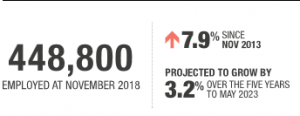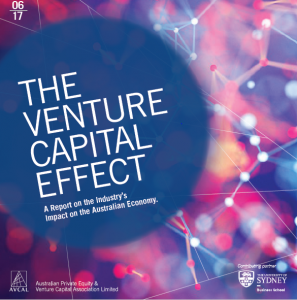
Financial and Insurance Services
A selection of articles on Australian financial services topics. It includes articles on infrastructure financing, the Australian Sustainable Finance Initiative, the Responsible Investment Association of Australasia, a privately operated Innovation Finance Fund, the Assistant Governor of the Reserve Bank on the availability of business finance, the Sustainable Australia Fund, the Federal Government’s venture capital programs (including case studies), the Department of Industry’s venture capital dashboard, the Federal Government’s Innovation Fund, links to details of tax incentives for early stage investors, profiles of the top twelve venture capital firms in Australia, articles giving a range of perspectives on venture capital in Australia.
This page does not seek to cover the full range of financing approaches for innovative firms – i.e. VC, private equity, capital markets, secondary boards, M&A, project financing, commercial loans and so on.
The article by the Department of Infrastructure, Transport, regional development and Communications covers ways the Federal government supports private investment in infrastructure projects. The Clean Energy Finance Corporation page covers ways that agency supports investment in clean energy projects, including leveraging of private investment.
Financial Services employment: https://australianjobs.employment.gov.au/jobs-industry/financial-and-insurance-services

While financial services is a large employer, it is not a major projected growth area, partly due to automation. Nonetheless it is central to financing innovation, construction/infrastructure, major projects and business in general. To avoid excessive government expenditure and involvement in the economy, the financial services sector is key to financing and investment to implement the development of all other sectors.

The VC Effect: Report on the VC Industry’s Impact on the Australian economy: Australian Private Equity and Venture Capital Association and University of Sydney
The Venture Capital Effect: At a Glance
- Venture capital is central to building a highly skilled, knowledge-driven economy with 75% of Australians believing the benefits of technology outweigh the risks.
- Venture capital provides startups with capital and expertise not available anywhere else.
- Venture capital funds startups, encourages the creation of firms, and leads to valuable knowledge spill-overs throughout the economy.
- Startups are the largest contributor to job creation in Australia, representing 90% of net positive job creation over recent years.
- Venture capital transforms old industries, and creates new ones.
- Venture capital-backed global giants include Apple, Microsoft, and Alphabet (Google) and in Australia, Atlassian, Cochlear, and SEEK.
- Despite rapid growth, Australia’s venture capital sector remains less than half the size of the OECD + average.
- Greater superannuation investment in venture capital is pivotal to Australia’s future.
- Venture-capital is vital to commercialising cutting-edge research.
A detailed explanation of the operation and economic/employment benefits of VC, with many Australian case studies. See p 67 for account of expansion of Australian VC from 2015-2020.
financing_innovative_entrepreneurship
Financing Innovative Entrepreneurship: 2015 Research paper of Department of Industry, Innovation and Science
Key points [edited excerpt]
- Innovation-active SMEs of any age and any degree of innovation novelty are more likely to seek and successfully obtain debt or equity financing than non-innovation active firms.
- The data suggests that debt finance is not an issue in Australia with success rates in obtaining debt finance at around 90 per cent in 2012–13.
- Equity finance success rates are considerably lower than debt finance at around 50 per cent. Approximately 4,500 young SMEs seeking equity finance in 2012–13 were unsuccessful.
- Venture capital investment in Australia has declined to 0.017 per cent of GDP ranking it low compared to many competitor countries. Unlike many OECD countries, such as the US and Israel, it has not bounced back to pre-global financial crisis levels.
- The success rate of firms applying for venture capital investment has fallen from 3 per cent in 2005-06 to just over 1 per cent in 2013–14.
- Australia’s early-stage venture capital investments are relatively low. At 0.007 per cent of GDP, it is half the OECD median (0.015 per cent GDP). Surprisingly, mature firms (5+ years) receive a large share of seed and start-up capital.
NB – other sources on this page indicate the Australian VC sector picked up considerably between 2015 and 2020.
From-Values-to-Riches-2020-full-report
Responsible Investing Association Australasia report: 2020 consumer survey regarding ethical investment.
KEY FINDINGS: [edited excerpt]
High expectations
• 86% of Australians expect their super or other investments, and 87% of Australians expect the money in their bank accounts, to be invested responsibly and ethically.
• 9 in 10 (89%) Australians feel it’s important that their financial institution invests responsibly and ethically across the board.
• 67% of Australians believe ethical or responsible banks perform better in the long term and 62% of Australians believe ethical or responsible super funds perform better in the long term (up from 29% in 2017).
• 87% of Australians think Australia’s financial services sector has a role to play in generating positive social, environmental and economic outcomes for the country.
The survey results indicate that the investment decisions of younger generations are more likely to be influenced by ethical considerations, and that women have higher expectations of ethical investment behaviour than men (p 15).
Department of Industry, Science, Energy and Resources on VC
deloitte-au-fs-future-financial-services-impact-australia-030516
The Future of Financial Services report co-produced by World Economic Forum and Deloitte focused on how disruptive innovations are reshaping the way financial services are structured, provisioned and consumed. It was based on extensive research undertaken with global industry leaders, innovators and regulators, in an effort to understand the transformative potential of innovation.
This report covers how disruptive innovations will affect business models/operations (and employment) in the financial services sector. As such it is less about financing innovative firms and associated employment created. But as it is a high level analysis of what is happening in the sector it is included.
What the Rest of the World Can Learn From the Australian Economic Miracle
New York Times article on how the Australian banking system and financial sector regulation stood up to the Asian and Global financial crises, underpinning prolonged economic growth.